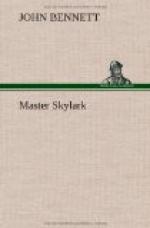“What, sir?” asked Nick; “a game?” and made the bellows whistle in his mouth.
“Nay, lad; a gittern.”
Nick and Cicely looked up, for his manner was very odd.
“Why, sir, I do na know. I could try. I ha’ heard one played, and it is passing sweet.” “Ay, Nick, ’tis passing sweet,” said Carew, quickly—and no more; but spoke of France, how the lilies grow in the ditches there, and the tall trees stand like soldiers by the road that runs to the land of sunny hills and wine; and of the radiant women there, with hair like night and eyes like the summer stars. Then all at once he stopped as if some one had clapped a hand upon his mouth, and sat and stared into the fire.
But in the morning at breakfast there was a gittern at Nick’s place—a rare old yellow gittern, with silver scrolls about the tail-piece, ivory pegs, and a head that ended in an angel’s face. It was strung with bright new silver strings, but near the bridge of it there was a little rut worn into the wood by the tips of the fingers that had rested there while playing, and the silken shoulder-ribbon was faded and worn.
Nick stopped, then put out both his hands as if to touch it, yet did not, being half afraid.
“Tut, take it up!” said Carew, sharply, though he had not seemed to heed. “Take it up—it is for thee.”
“For me?” cried Nick—“not for mine own?”
Carew turned and struck the table with his hand, as if suddenly wroth. “Why should I say it was for thee? if it were not to be thine own?”
“But, Master Carew—” Nick began.
“‘Master Carew’ fiddlesticks! Hold thy prate. Do I know my own mind, or do I filter my wits through thee? Did I not say that it is thine? Good, then—’tis thine, although it were thrice somebody else’s; and thrice as much thy very own through having other owners. Dost hear? Well, then, enough—we’ll have no words about it!”
Rising abruptly as he spoke, he clapped his hat upon his head and left the room, Nick standing there beside the table, staring after him, with the gittern in his hands.
CHAPTER XXVI
TO SING BEFORE THE QUEEN
“Sir Fly hangs dead on the
window-pane;
The frost doth wind his shroud;
Through the halls of his little summer house
The north wind cries aloud.
We will bury his bones in the mouldy wall,
And mourn for the noble slain:
A southerly wind and a sunny sky—
Buzz! up he comes again!
Oh, Master Fly!”
Nick looked up from the music-rack and shivered. He had forgotten the fire in studying his song, and the blackened ends of the burnt-out logs lay smouldering on the hearth. The draught, too, whistled shrilly under the door, in spite of the rushes that he had piled along the crack.
The fog had been gone for a week. It was snapping cold; and through the peep-holes he had thawed upon the window-pane with his breath, he could see the hoar-frost lying in the shadow of the wall in the court below.




